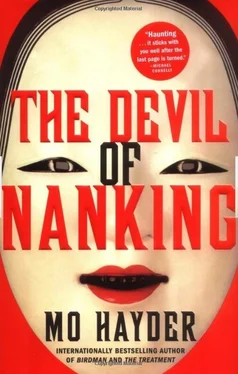But she wasn’t to be shaken. She stood stiffly next to me, her eyes locked on Purple Mountain. ‘Yes, you can,’ she whispered. ‘You can predict the future. The future is an open window.’ She put her hand lightly on the shutters. ‘Just like this one. It is easy to look ahead because the future is the past. Everything in life revolves, and I have already seen exactly what will happen.’ She turned and looked at me with her yellow eyes, and for a moment it seemed she was staring steadily into my heart. ‘If we stay in Nanking we will die. You know it too. I can see it in your eyes – you know it very well. You know your precious president is too weak to save us. Nanking doesn’t stand a chance in his hands.’
‘I will not listen to another word,’ I said firmly. ‘I will not have the generalissimo spoken about like this. I forbid it. Absolutely forbid it. Chiang Kai-shek will save this city.’
‘That foreigner’s lapdog.’ She sniffed contemptuously. ‘First his own generals have to force him to fight and now he can’t even defeat the Japanese – the very same army that trained him!’
‘Enough!’ I was shaking with anger. ‘I have heard enough. Chiang Kai-shek will defend Nanking and we, yes, you and I, we will be here to see it.’ I took her by the wrist and led her back to the chest. ‘I’m your husband and you need to trust my judgement. Unpack this now. We’re going nowhere – certainly not back to Poyang. Poyang killed my mother and for once I am instructing you clearly, as befits a husband: you will put your faith in Chiang Kai-shek, the supreme arbiter, a man far greater, far stronger than all of your superstitions put together.’

Nanking, 16 November 1937
How I regret those words now. Now that I am here, alone in my study, the door locked, my ear pressed furtively to the radio, how I regret my proud stand. I am afraid to let Shujin hear the news the radio is delivering because she would crow with delight to hear today’s terrible report, so terrible that even I quake to write it down here. I will write it in small characters to make it easier to bear: Chiang Kai-shek and the Kuomintang government have fled the city, leaving it in the hands of General Tang Shengzhi.
Now I have written the appalling sentence what is there to do but stare at it, the blood rushing in my head. What shall I do? I can neither sit still, nor stand, nor think about anything else. Commander Chiang gone? General Tang in his place? Can we trust him? Am I to crawl to Shujin and tell her that I was wrong? Allow her to see me weakened in my resolve? I cannot. I cannot retreat. I am caught in a wretched web of my own making, but I must stand my ground, no matter how queasy it makes me. I will barricade the house and we shall wait out the arrival of the Imperial forces. Even if the unthinkable does happen, and our troops are defeated, I know the Japanese will treat us well. I visited Kyoto as a student and I speak the language well. They behave with infinite care and sophistication – one only has to study their deportment in the Russian war to know them as a civilized people. Shujin will be surprised to find that they even have things to teach us. We will prepare a sign in Japanese saying, ‘Welcome’, and we’ll be safe. Today I saw two families in an alley off the Hanzhong Road working on such a sign.
But as I write, as night falls on Nanking outside the walls of the house, as the city descends into perfect silence, with only the occasional distant shudder of a Nationalist tank prowling Zhongshan Road, my heart is like ice. It is all I can do not to go downstairs and confess my fears to Shujin.
She has hardened to me since I refused to return to Poyang. Daily I repeat my list of reasons for not fleeing, pretending not to know how hollow they sound: in the countryside there will be no medical care, no sophisticated methods for our child’s birth. I have tried to paint a picture of the disasters that would follow if we were stranded in the countryside, with only an old peasant woman to help Shujin in her confinement, but every time I say this she flies at me with fire in her eyes: ‘An old peasant woman? An old peasant woman? She would know better than your foreign doctors! Christians!’
And maybe I have worn her down, because she has lapsed into silence. She has spent most of today sitting limply in her chair, her hands folded on her stomach. I can’t help thinking about those hands, so small, so white. All day I was unable to stop staring at them. They must have drifted unconsciously to her stomach because she would never knowingly stroke her abdomen – she is certain that to do so would make the baby spoiled and demanding, the very words my mother used with me: ‘Really, I must have rubbed my stomach too often to produce such a proud and obstinate child.’
When I consider the possibility that our child could be obstinate, or arrogant, or selfish, or any other undesirable characteristic, I could weep. Proud and inflexible or spoiled and demanding – all these things depend on one thing: on our child having life in the first place. It all depends on Shujin surviving the inevitable attack on Nanking.
Maybe the worst thing that can happen to you is to lose someone and not know where to look for them. The Japanese believe that on O-Bon night the dead come back to their loved ones. They swoop out of the ether, sucked out of their eternal doze by the call of their living descendants. I’d always imagined O-Bon night as dreadfully chaotic, with spirits zipping around the air, knocking people over because they were going so fast. Now that I was in Japan I wondered what happened to those who didn’t know where their dead lay. What happened if they had died in a different country? I wondered if spirits could cross continents. If they couldn’t, then how would they find their way back to their families?
It was spirits I was thinking about that night, sitting in the gloom with my endless cigarettes, trying to decide how I was going to convince Shi Chongming to talk to me, when Junzo Fuyuki and his men came to the club for the second time.
I was summoned by Strawberry to join them. They were seated at the usual long table – all except the Nurse, who was already sequestered in the dark alcove, the light malforming her shadow on the wall, horse-like, a chess-set knight, so tall that she almost appeared not to grow upwards from the floor but to be suspended by her shoulders from the ceiling. Fuyuki seemed to be in a good mood, and there was a new guest in the seat next to me, a huge man in a silver suit, with a congested face and hair so short that the fat ridges at the back of his skull were visible. He was already drunk – telling jokes, slamming his chair on the floor every time he got to the punchline, lifting his eyebrows comically and muttering something that made the men hoot with laughter. He spoke Japanese with an Osaka accent, the way I used to imagine all the yakuza did, but he wasn’t one of the gang. He was a friend of Fuyuki’s and the Japanese girls said he was famous – they were giggling at him, hands up to their mouths, sighing to each other over him.
‘My name is Baisho,’ he told the Russians, in stilted English, waving at them with his thick, gold-ringed fingers. ‘My friends call me Bai, because I have twice their money and I am twice’ – he waggled his eyebrows suggestively – ‘twice the man!’ I sat silently, painting the kanji for Bai in my head. Bai san was using it to mean double, but it had other meanings too – it could mean ‘plum’ if written with a tree combined with the symbol for ‘every’, or it could mean shellfish, or it could mean cultivation. But what Bai san really made me think of was the way his name sounded in English: Bison.
Читать дальше













